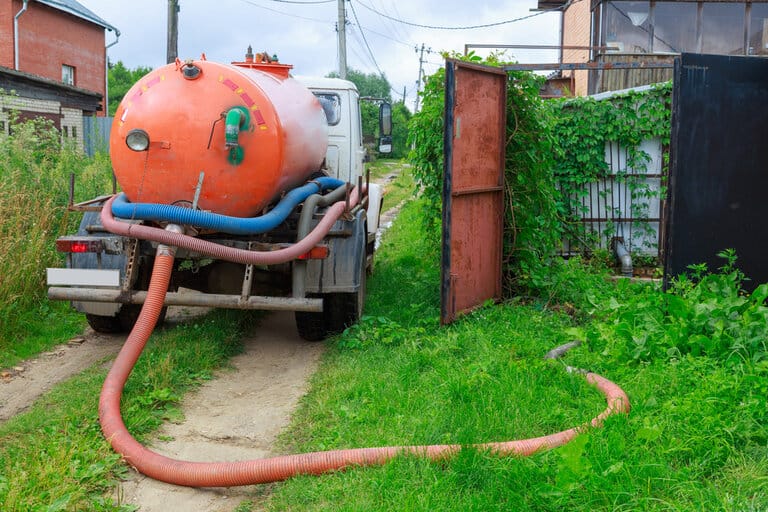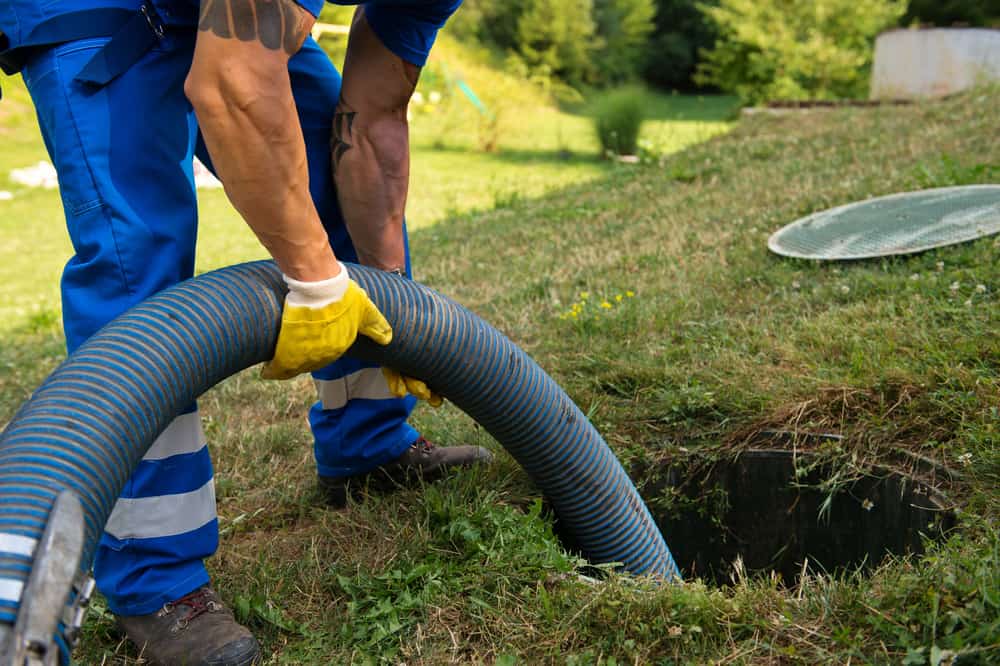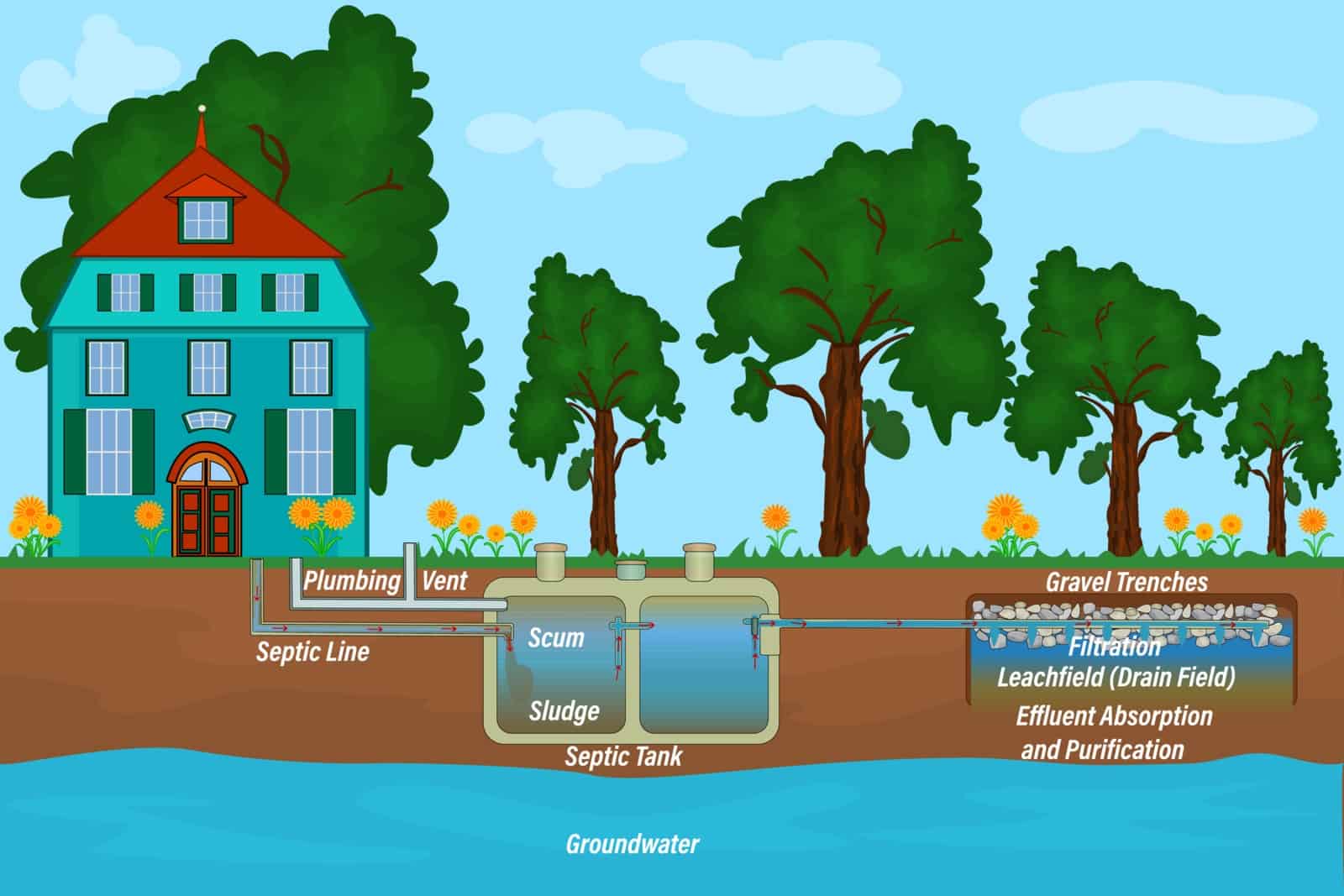“How do septic tanks work?” or “How often does my septic tank need pumping?” may be questions that you’re asking if this is the first time you have ever dealt with a septic system.
If you have never lived in the country, the idea of dealing with a septic system may come as a surprise. However, especially in rural areas, septic systems are often more the rule than the exception.
If you have always lived in an area with a municipal sewage system, you may be nervous about the idea of switching from sewer to a septic system.
After all, for years, you probably just flushed your toilet, pulled the plug on the bathtub, or drained the washing machine, giving little thought to where your waste products went. You paid a monthly bill just so you didn’t have to worry about it.
The idea of being solely responsible for the management of your waste can be intimidating. But it doesn’t have to be. And, you are not alone.
Many people have questions and worries about living with a septic system for the first time. However, the cure for this uncertainty is education. Learning about a septic system can help you be reassured that you can live with this kind of waste disposal, worry free. These systems are surprisingly simple, and were actually invented accidentally.
You don’t have to live off the grid to have a septic system. They are common in rural areas as well as in neighborhoods in many parts of the country.
Invention of Septic Tanks
The septic tank was created around 1860, when a Frenchman named Jean-Louis Mouras ran clay pipes from the toilets in his home to a concrete tank outside the house. He wanted to spare his family members from the inconvenience of having to use outhouses. Mouras then ran an overflow pipe from his concrete tank to a cesspool that the city would empty periodically.
After about ten years, Mouras dug up his concrete tank, figuring he would have to empty it. The man was pleasantly surprised to find that no solids were in his tank. Mouras began improving his invention and soon filed for a patent, which allowed him to take his design overseas to the United States.
While Mouras invented the septic system, engineers in the United States perfected its design. They began constructing septic tanks made of all sorts of materials and by trial and error found out what materials and methods worked best for septic tanks.
In the 1950s and 1960s, due to the failure of some of these primitive designs, the government began creating regulations regarding septic systems and began requiring inspections as well. Poorly performing septic systems were leading to pollution problems, as well as public health issues.
Septic Tanks
Nowadays, before a builder can install a septic tank, the plans for it must be approved and a permit issued. The health department, the county building commission, or some other government entity must inspect the installation of the septic tank and the field lines.
After all, if a septic tank is improperly installed, it not only may cause the homeowner hassles. It can also release potentially dangerous bacteria into nearby streams, ponds, lakes, and other bodies of water. These bacteria can make both humans and other animals sick. However, a properly installed, properly maintained septic system will cause none of these problems.

How Septic Tank Works
To help you understand the need for septic pumping, it might be best to first understand how septic tanks operate.
While the idea of human waste going into the ground might seem primitive and unsanitary, it actually is a safe and modern way of managing your family’s waste water. The technologies used to process waste in a septic tank are actually very similar to those used in many modern cities’ sewage treatment plants.
A septic tank consists of two main parts:
- Septic tank
- Drain field
Septic Tank
The septic tank is exactly what is sounds like. It is a large container that is buried in the ground. Sometimes septic tanks are made from concrete, but others are made from heavy-duty plastics.
Septic tanks can last for over 40 years. If you install a septic tank in your new construction, you may never have to buy another one, especially if you maintain it over the years.
The septic tank is connected to the house by a large drain pipe. Household waste flows through the pipe into the septic tank.
Drain Field
The other part of the septic tank is the drain field, a series of perforated pipes buried shallowly in the ground. Sometimes people call the drain field other names, like field lines or leach lines. These lines are connected to the septic tank by a solid pipe.
How it Works
Inside the septic tank, the waste separates into three parts:
- Heavy solid waste sinks to the bottom
- Grease and oils, floatable materials, float to the top
- Liquids are in the middle
The liquid, also called effluent, is discharged through a pipe to the drain field where it slowly and gradually leaches down through the layers of dirt and rock to the groundwater. The leaching action of the dirt and rock purifies the liquid until it is free from contaminants and bacteria. Nothing but pure, clean water will go into the ground water from the septic field lines.
In many septic systems, gravity does all the work for you. While there are some kinds of septic systems that rely on an electric septic tank pump, most of these systems are installed to take advantage of gravity. The water and waste simply flow downhill, and you don’t have to worry about your waste disposal if your electricity goes out.
Bacteria
While the septic tank and the field lines are the most expensive and visible part of the system, the real work of the septic system is done by things that are too small to be seen by the naked eye. Bacteria are the key to ensuring that your septic tank works properly. Microscopic bacteria in the septic tank digest the solids in what is flushed into the tank.
The bacteria are what keep the tank from regularly filling up with flushed solid things like feces, toilet paper, and other things that go down the drain. In the septic tank, anaerobic bacteria and enzymes digest the solid waste and the floatable material into fluids. Then, this fluid mixes into the liquid layer and is flushed out to the drain field.

When to Call a Professional About Septic Tank Pumping?
Most of us do not want to give much thought to what is happening to our waste when it goes down the drain. But, since you are the homeowner, and you don’t have a sewer system, you need to have your septic system in the back of your mind at least a few times a year.
However, just observing what is going on in and around your house can tip you off to some potential problems with your septic system.
1. Sewage backing up in the house
First, if you have sewage backing up into the house, that is an emergency. Call the septic maintenance company right away. If your septic tank is having issues, you may end up with sewage in many places, including the showers, sinks, and even in the washing machine. Any place that has a drain can end up with sewage in it.
So, if you start having this problem, stop running water in the house, turn off the dishwasher, and don’t flush a toilet until someone has checked your septic tank. After all, nobody wants to figure out how to clean sewage out of the dishwasher!
2. Smell
Second, use your nose. If you can’t smell anything, that is a good sign. Septic systems that are working well will not release any smelly gasses into the house and in the yard.
However, if you start getting a whiff of sewage, you may want to go ahead and call the septic pumping company and have them take a look. Sometimes, the smell will be in the house, and other times it will be outdoors.
3. How Are the Drains Draining?
Next consider, are your drains slow? Of course, it’s not uncommon for shower drains to get clogged with hair. But if you’ve unclogged the drain, and it’s still slow, you may have reason to be concerned, especially if ALL the drains in the house are emptying slowly.
This is a hint that something is brewing in the septic system.
4. Wet Yard that Won’t Dry?
Consider if you have a soggy place in the yard near the drain lines that just won’t dry out. Especially if the soggy area smells bad, you may need to call a professional.
Sometimes, when the septic tank is too full, solids can be pushed out into the drain lines, clogging them with solids. Then the pipes around the clog will start leaking sewage into the yard. Rectifying this problem could be a more expensive repair than just simply pumping the tank, so do not put off calling the septic tank pump company.
5. What Does the Grass Look Like?
Certainly, you may live somewhere without grass, like in the southwest. But if you do have grass, how does the grass that is growing on the drain field look?
Of course, it is pretty normal for the grass to grow a bit greener on the field lines. This is a product of the fact that there are more water and nutrients available in the soil. However, if the ground is rather spongy and the grass grows significantly faster on the field lines, you may want to get your septic system checked to make sure it is working correctly.
Septic Tank Maintenance and Inspection
Septic tank maintenance – It isn’t a bad idea to have your septic system inspected once a year by a professional. He or she will pop the top on the septic tank and examine the layers in the tank.
Generally, you want the layer of the solids, or sludge, on the bottom of the tank to be less than a third of the total volume of the tank.
When to schedule septic tank pumping depends on many factors. These include how many people live in the home (adults and children) and the size of the septic tank. It’s important to consider other factors such as if the people are home 100% of the time or do they go to work and/or school and is it a part time residence, etc.

How Often Should You Schedule Septic Pumping?
If your drains and toilets are working properly, and there is no odor of sewage in the house or yard, you can assume that your septic tank is operating correctly. However, that doesn’t mean that the septic tank is just something that you can ignore indefinitely.
You will have to consider septic tank cleaning and maintenance if you live on a property with a septic system for any length of time.
If you don’t pay at least occasional attention to it, your septic tank might have problems, and, as things like that generally turn out, it will be at the worst possible moment. This may include on a holiday or weekend when it will be more costly to have a person come out.
As with so many other things, it’s best to be proactive with septic tank pumping. Schedule an inspection before there is a problem.
According to the EPA, you should schedule septic pumping once every three to five years. If you are moving into a new home, it might be a good idea to have the septic tank pumped fairly soon after you move in just to make sure everything is operating correctly.
Additionally, when the septic maintenance person is there, you can ask them questions about your system. You should ask about things you should avoid flushing down the drains, if there are any special maintenance chores that you need to do, and if your septic system seems to be in good condition.
How Much Does Septic Tank Pumping Cost?
The total septic tank pumping cost can depend on what area of the country in which you live. Generally, it will cost about 30 cents per gallon to pump your tank. If you have a larger tank, it will cost more to pump it than if you have a smaller tank.
Most tanks range between 600 and 2,000 gallons in size. Therefore, it will probably cost between $180 and $600 to pump your tank. Of course, the size of your tank will affect how often you can go before you have to pump it again. This is because a larger tank won’t have to be pumped as often as a smaller one. However, that again depends on how many people live in the home full time.
In addition, septic tank pumping service will vary by location.
It can sound expensive to have to pump your septic tank every 3 – 5 years. You may be tempted to put it off if you are having a year when the budget is tight. Think this over carefully, however, before you procrastinate this task.
If your tank allows solids to overflow into the leach lines, and they become clogged, you may need to have the lines replaced. This can can cost $2,000 – $3,000. If this task is procrastinated for decades, septic tank pumping may become septic system replacement.
Be clear with the maintenance tech to understand costs and what you are paying for. Also be clear if they are pumping the septic tank or performing septic tank cleaning.
Septic Tank Pumping Near Me
Perhaps you just moved in, or maybe you are seeing some tell-tale signs listed above that you need to have your septic tank pumped. You may want to ask your neighbors who they use for septic tank pumping. Ask friends in the area who they use.
If you are at a total loss, contact your county health department. You can also call the county building commission for suggestions for a reliable, reasonably priced septic maintenance company in your area.
Don’t put off this task. At the very least, have your tank inspected to ensure that you can go another year or two between septic tank pumping. You may actually need to scrape up the money to have the tank pumped. Or, if you are lucky, the technician may say that you can hold off another year or two before having it pumped.
Of course, the recommended intervals between having your tank pumped can vary depending on your usage and the size of the tank. If you have a 2,000 gallon tank and there are only one or two people occupying your home, you may be able to wait longer between pumpings.
If you have a large family, however, and a tank that is on the smaller size, it may be an annual event to have the tank pumped. After you have lived in your home for a few years, you will learn the eccentricities of your septic tank. You learn your habits and how often you need to call the septic pumping company.
Advantages of Septic Tanks
While it requires the homeowner to be a bit more proactive, it is very nice to not have a monthly sewage bill because you have a septic tank. Additionally, for those who enjoy the independent life of a homesteader, septic systems are the way to go.
Whether you are living off the grid or in a residential area, septic systems are fairly low maintenance as a rule. Keeping up with pumping and maintenance is fairly straight-forward. It’s the same pumping for off-grid septic systems as it is for people living in suburban areas.

